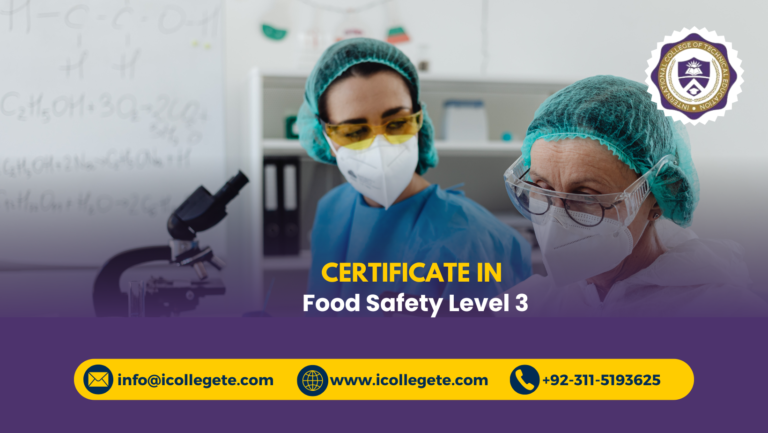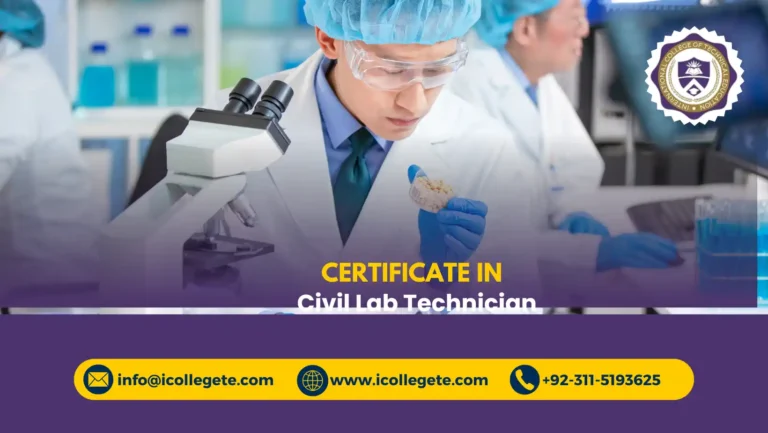Ensuring food safety is crucial for anyone working in food handling, production, or service. In Rawalpindi, the Food Safety Level 2 course offers individuals the essential knowledge and skills to manage food safety effectively.
The Food Safety Level 2 course is designed to provide essential training for those who handle food directly or manage food establishments. This course equips individuals with the skills needed to understand and implement food safety practices at an advanced level. It aims to reduce the risk of foodborne illnesses by promoting effective hygiene standards and safety procedures.
This course is ideal for anyone working in the food industry, including food handlers, chefs, food managers, and supervisors. The curriculum focuses on key areas of food safety, including food hygiene, contamination prevention, and legal requirements. The Level 2 certification meets industry standards and is recognized internationally, making it a valuable qualification for food safety professionals.
Study Units
The course is structured into several key study units that address different aspects of food safety. These units include:
- Food Safety Hazards: Understanding different types of food safety hazards (biological, chemical, and physical) and how they affect food safety.
- Personal Hygiene and Health: Best practices for maintaining personal hygiene to prevent contamination and foodborne illnesses.
- Temperature Control: Managing and monitoring the temperature of food during storage, preparation, and service to prevent bacterial growth.
- Cleaning and Sanitizing: Techniques for effective cleaning and sanitizing of food preparation areas and equipment.
- Food Handling and Storage: Proper methods for handling and storing food to avoid cross-contamination and spoilage.
- Food Safety Legislation and Compliance: An overview of food safety regulations and laws, including local and international standards.
Learning Outcomes
Upon completing the Food Safety Level 2 course, participants will be able to:
- Identify and manage food safety hazards effectively.
- Implement hygiene practices to minimize the risk of contamination.
- Understand the role of temperature control in preventing foodborne illnesses.
- Develop and maintain cleaning and sanitation protocols.
- Ensure food safety standards are met in compliance with local and international regulations.
- Be capable of managing food safety in a variety of food-related environments.
Course Benefits
The benefits of undertaking the Food Safety Level 2 course are numerous:
- Increased Job Opportunities: With the growing importance of food safety, individuals with certification are highly sought after in the food industry.
- Improved Food Safety Knowledge: The course provides participants with a comprehensive understanding of food safety practices and how to implement them.
- Regulatory Compliance: By completing the course, food establishments ensure they comply with local and international food safety laws.
- Risk Reduction: With the knowledge gained, food handlers and managers can significantly reduce the risk of foodborne illness outbreaks.
- Enhanced Professional Reputation: A certification in food safety boosts credibility and enhances professional standing within the food industry.
Who Is This Course For?
This course is ideal for anyone involved in food handling or management, including:
- Food handlers and chefs working in kitchens or restaurants.
- Food supervisors and managers.
- Individuals involved in food retail, such as grocery stores or catering services.
- Those interested in starting a career in food safety or food industry management.
- Entrepreneurs planning to open their own food-related businesses.
Future Progression
Upon completing the Food Safety Level 2 course, individuals have a variety of options for further career development:
- Advanced Food Safety Courses: You can pursue Level 3 or 4 courses in food safety to deepen your knowledge and qualification.
- Food Safety Auditor: Individuals with higher-level certifications can work as food safety auditors, inspecting food establishments for compliance with safety standards.
- Health and Safety Manager: Those who gain experience in food safety management can move on to roles such as health and safety managers within food-related businesses.
- Regulatory Roles: There are also opportunities in government agencies or food safety organizations, where professionals ensure compliance with national food safety regulations.
the Food Safety Level 2 course in Rawalpindi offers essential knowledge and certification for anyone working in the food industry. It ensures that individuals not only meet regulatory standards but also contribute to the overall safety and quality of food served to the public. Whether you’re looking to advance your career in food safety or improve your skills for your current role, this course offers invaluable benefits and future progression opportunities.





